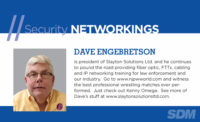We are a long, long way from the days of the “$99 installed home security system” with a five-year contract for servicing and monitoring. Today customers just go to the internet or local box store (if it’s still in business), order up a Wi-Fi camera, baby monitor or other “connected” device, hook them to their network with a QR code, and happily sit on their couch, changing their lighting, closing their blinds and checking on their kids via surveillance camera.
As we all know the market for “traditional” electronic security companies is changing rapidly, and the low to middle segments of home alarms are rapidly disappearing as customers bypass traditional methods and buy one of the many “lick and stick” alarm/camera systems that are available today. While we professionals may scoff at these systems and the type of detection they provide, the consumer is letting us know that they will hook just about anything to their home network without installation assistance, and think their self-installed system will “secure” their home and family.
So, while the $2 million-plus homebuyer wants a professional alarm system installed, the lower end of the market is simply shrinking away, a victim of the DIY ethic and cheap IP devices. It is estimated that the typical homeowner with a family will have at least 25 network-connected devices in their home by 2025. What most DIYers don’t grasp is that cheap doorbell cameras and other home enhancement products (how come my crock pot doesn’t have an app?) are readily used as backdoor entrances for hackers to get into the guts of a target network. How much security and software testing goes into a $43 doorbell camera (as seen on Amazon)? Your clients or former clients are placing landmines in their own network and won’t have any idea how their network has been hacked.
So, we’ve got some issues that should raise concerns for alarm installation companies. And there’s a new Big Dog that may take even more market share of residential customers. A BSP is a broadband service provider. You know, the people who are hooking up your customers to big pipe fiber-optic internet. We used to call them “cable providers.” These companies typically have a set servicing area where their network extends, and try to get every home and business in their area onto their network and paying them monthly for internet connectivity.
While it sounds like the BSP business would be simple to provide and would lock their customers in, trouble is on the horizon. There are now companies rolling out 5G stationary wireless broadband internet connections, so there is now a wireless connectivity solution. As we are seeing with traditional cable TV companies, customers are rapidly dumping their existing cable or satellite TV service for selected streaming services that are using the big pipe fiber-optic internet connections to bring the service to the client’s devices.
The problem for the BSPs is that their service is becoming commoditized, with other companies offering the same service. Think about a street corner with a gas station on each corner. If one station drops (or raises) the price of regular on their street sign, their competitors will rapidly match it. To consumers regular gas is the same wherever they buy it, so why not save a few dollars and go for the low price? It’s the same with broadband internet pipes.
BSPs are very concerned that as competition increases for broadband delivery, prices will have to fall, affecting profit margins and perhaps the BSPs existence. Calix is a prominent supplier of end-to-end fiber-optic and cable network devices for BSPs. Think the box on your wall or desk and the machines at the head end. In an effort to help their BSP clients maintain and grow their business, Calix is rolling out enhanced security systems and unique services that they are promoting to increase RMR for the BSPs.
As the world becomes more complex, there is more to security these days than a deadbolt on the door and a shotgun in the front closet. These security issues include network security, i.e., hacking detection and prevention, monitoring of family internet and social media usage, and the security of the devices they’ve acquired.
Calix has partnered with Arlo, which is providing low-cost yet unique IP Wi-Fi cameras for home and business use. While there are bunches of low-cost IP cameras available, the Arlo cameras tout artificial intelligence (AI) capabilities, such as the ability to distinguish between a package or a person on your doorstep. In today’s turbocharged technical environment, technologies like AI, which had been only available in high-end commercial-type systems, have filtered down to the $80 IP camera.
Surveys have shown that 52 percent of BSP management people believe that the key to retaining and growing their customers is to upsell them on other services. Because, let’s face it, an internet pipe is a pipe and as long as a user can fire up Google, they really don’t care what or whose network they are using. Speaking of Google and their monster competitor Amazon, 69 percent of BSPs fear that these mega companies will damage their businesses with inexpensive devices and services. The bottom line is that for BSPs, speed and price are no longer differentiators for their offerings. Fiber is fiber, and they are all the same.
What Calix has done is develop a suite of products including the Arlo home security/video system to provide increased security and the fabled “peace of mind” that our industry has been promoting for years. Calix and their partners are providing systems and services that will:
Monitor, control and report internet and social media usage — aimed at parents with growing children, who increasingly are being cyberbullied or going to places on the internet where they don’t belong.
“Surveys have shown that 52% of BSP management people believe that the key to retaining and growing their customers is to upsell them on other services.”
Protect customers’ networks from spyware, malware and internet-based attacks — along with text/email notifications to users that events have occurred.
Provide warranty protection for everything on a customer’s network including servers, printers, laptops, smartphones, etc. (This one is a little hard for me to grasp. Are they going to replace my $2,000 laptop? What if an old IP camera bites the dust? Are they going to find a replacement?)
All of these app services are cloud-based, so no extra equipment should be needed. And everything comes with an app for command and control.
What all of these proposed services can do for the BSP company is really two simple things: first, boost recurring revenues (“Complete network protection for only $9.99 a month!”); the second and probably most important benefit is to increase the value of the BSP’s brand, taking them from a simple internet pipe provider to a valued service company that their customers trust.
What are the options for traditional security companies in the face of such potential competitive offerings? I would think the first thing is to try your best to keep your customers under contract, although one of the big selling features of today’s IP offerings is the “no agreement, no contract” terms preferred by today’s consumer.
What needs to happen to help us retain our mid-level residential customers is for a deep pocket company to develop similar services that can provide a holistic level of protection for customers that includes their homes, networks and internet usage by family members. We can go around the world in a flash over the internet; the world can also be coming at a network with evil intent.
More money is stolen over the internet than has ever been grabbed in every bank robbery known to man. In the future, true security will protect the network and devices first, while also including traditional burglar, panic and fire alarm capabilities. (The Arlo system ads state that it will send messages to the user if a smoke alarm goes off; it doesn’t specify whether it’s based-on sound detection or smoke obscuration of a camera view.)
What do we do? I’d say either get onboard with network and internet monitoring, or say goodbye to a good percentage of your residential clients. You’re either on the bus or getting run over.







